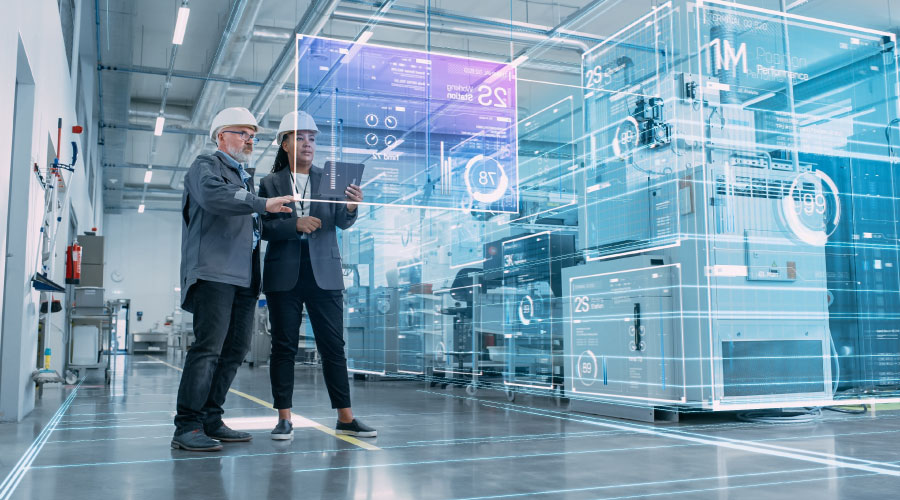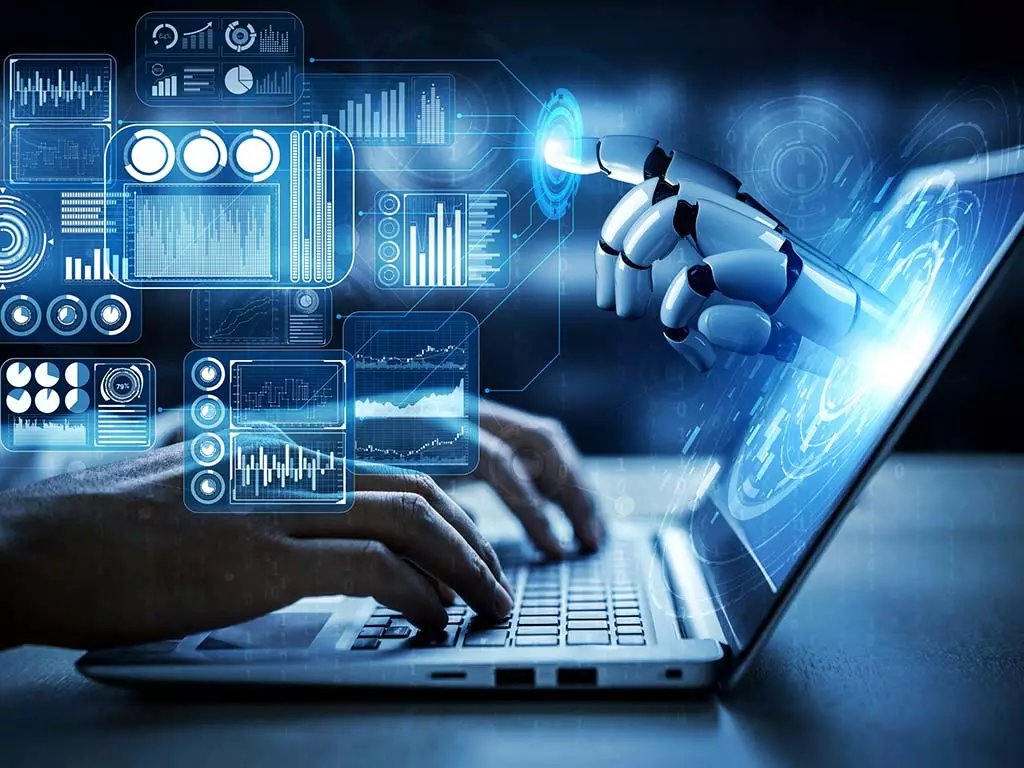Impact of Artificial Intelligence on Business Processes
Artificial intelligence (AI) is revolutionizing industries across the globe. With the ability to process vast amounts of data, automate complex processes, and even learn from experience, AI has become a driving force in business innovation and efficiency. Its impact is evident in various sectors, from healthcare to finance, manufacturing to retail, and beyond. As companies embrace AI technologies, they are not only enhancing productivity but also reshaping the competitive landscape in profound ways. This article explores how AI is transforming different industries, driving growth, and presenting new challenges and opportunities.
AI in Healthcare
The healthcare industry has witnessed one of the most significant transformations due to AI. AI-powered tools and applications are enhancing diagnostics, treatment plans, drug discovery, and patient care. For instance, AI algorithms can analyze medical images with high accuracy, identifying diseases such as cancer or detecting abnormalities in X-rays, MRIs, and CT scans. This allows for earlier and more accurate diagnoses, which can save lives and reduce costs.
Moreover, AI is improving patient care through personalized treatment recommendations. Machine learning models analyze patient data to predict which treatments will be most effective, reducing the need for trial-and-error approaches. AI-driven chatbots and virtual health assistants are also enhancing patient engagement, offering 24/7 support and answering medical queries, which can reduce the workload on healthcare professionals.
Drug discovery is another area where AI is making a significant impact. AI algorithms can sift through vast datasets to identify potential drug candidates faster than traditional methods, cutting down the time and cost of bringing new drugs to market. Additionally, robotic process automation (RPA) is streamlining administrative tasks, such as scheduling appointments, managing patient records, and processing insurance claims, allowing healthcare staff to focus on patient care.
However, the integration of AI in healthcare also raises ethical concerns. Issues such as data privacy, the potential for algorithmic bias, and the need for transparency in AI-driven decisions must be addressed to ensure that AI enhances rather than compromises patient care.
AI in Finance
The finance industry has been an early adopter of AI technologies, using them to enhance efficiency, improve decision-making, and offer more personalized services. AI-powered systems are transforming areas such as fraud detection, risk management, trading, and customer service.
In fraud detection, AI algorithms analyze patterns in transaction data to identify unusual or suspicious activities in real-time. These systems learn and evolve, becoming more effective at detecting fraud as they process more data. AI is also being used to assess creditworthiness, offering more accurate and objective evaluations than traditional methods, which can sometimes rely on human judgment.

Algorithmic trading is another area where AI is making waves. AI-driven trading systems can analyze vast amounts of financial data and execute trades at speeds far beyond human capabilities. These systems can make decisions based on complex models and even adapt to market conditions, improving the efficiency and profitability of financial markets.
In customer service, AI chatbots and virtual assistants are providing faster and more personalized responses to customer queries. These tools can handle a wide range of customer interactions, from answering questions about account balances to offering investment advice, freeing up human agents for more complex tasks.
However, the use of AI in finance also comes with risks. The potential for AI-driven systems to make errors or be manipulated by bad actors is a concern, as is the impact on jobs. As AI systems take over more routine tasks, financial institutions must find ways to retrain and redeploy their workforce to prevent widespread job losses.
AI in Manufacturing
The manufacturing sector is experiencing a transformation thanks to AI-driven technologies. From optimizing production processes to improving quality control, AI is making factories more efficient and competitive.
One of the most notable applications of AI in manufacturing is predictive maintenance. AI-powered systems analyze data from machines and equipment to predict when a failure is likely to occur. This allows companies to perform maintenance before a breakdown happens, reducing downtime and saving money. In some cases, these systems can even perform automated repairs, further improving efficiency.
AI is also playing a crucial role in quality control. Machine learning algorithms can analyze products on the production line in real-time, identifying defects or inconsistencies that might be missed by human inspectors. This leads to higher-quality products and reduces waste.
Revolutionize Your Workspace: Top 10 Gadgets for Productivity!
In addition to improving efficiency, AI is helping manufacturers respond to changing market conditions more quickly. AI-driven systems can analyze demand data and adjust production schedules in real-time, ensuring that manufacturers are producing the right amount of product at the right time. This is particularly important in industries with complex supply chains, where delays or inefficiencies can have significant financial consequences.
However, as AI becomes more integrated into manufacturing, concerns about job displacement are growing. While AI-driven automation can increase efficiency, it can also reduce the need for human workers in certain roles. As with other industries, manufacturers will need to balance the benefits of AI with the potential impact on their workforce.
AI in Retail
The retail industry is leveraging AI to enhance customer experiences, optimize operations, and improve inventory management. AI-powered tools are enabling retailers to provide personalized shopping experiences, anticipate customer needs, and streamline supply chains.
Personalization is one of the most visible ways AI is transforming retail. Machine learning algorithms analyze customer data, such as purchase history and browsing behaviour, to recommend products that are tailored to individual preferences. This level of personalization can increase sales and customer loyalty, as shoppers are more likely to return to retailers that understand their needs.
AI is also being used to improve inventory management. AI-powered systems analyze sales data to predict demand and ensure that retailers have the right products in stock. This helps prevent stockouts and overstocking, both of which can lead to lost sales and increased costs. Some retailers are even using AI-powered robots in their warehouses to automate tasks such as picking and packing, further improving efficiency.

In addition, AI is enhancing customer service through chatbots and virtual shopping assistants. These tools can help customers find products, answer questions, and even assist with making purchases, providing a more seamless shopping experience. AI-driven checkout systems, such as Amazon Go, are also eliminating the need for traditional checkout processes, allowing customers to pay automatically as they leave the store.
However, the adoption of AI in retail also raises concerns about data privacy. As retailers collect and analyze more customer data, they must ensure that they are protecting that data and complying with privacy regulations.
AI in Transportation and Logistics
The transportation and logistics industry is being transformed by AI in several ways, from improving route optimization to enabling autonomous vehicles. AI is helping companies in this sector reduce costs, increase efficiency, and improve safety.
Route optimization is one of the key areas where AI is making an impact. AI-powered systems analyze traffic patterns, weather conditions, and other factors to determine the most efficient routes for deliveries. This helps reduce fuel consumption, lower delivery times, and improve customer satisfaction. AI is also being used in warehouses to optimize the placement of goods, making it easier and faster to pick and pack items for shipment.
Autonomous vehicles are perhaps the most high-profile example of AI in transportation. While fully autonomous vehicles are not yet widespread, AI-powered features such as adaptive cruise control, lane-keeping assistance, and automated parking are becoming increasingly common. These technologies are improving safety by reducing the likelihood of human error, which is a leading cause of accidents.
The Ultimate Buyer’s Guide: Best Gadgets Under $100 That Impress!
In logistics, AI is streamlining the supply chain by predicting demand, optimizing inventory, and automating various tasks. For example, AI-powered drones are being used for inventory checks in large warehouses, while robotic process automation is handling routine tasks such as order processing and shipment tracking.
However, the widespread adoption of AI in transportation also presents challenges. Autonomous vehicles, for example, raise questions about liability in the event of an accident, as well as concerns about job displacement for drivers. Companies in this sector will need to address these issues as they continue to integrate AI into their operations.
AI in Education
The education sector is also benefiting from the adoption of AI, which is enhancing both teaching and learning experiences. AI-powered tools are being used to personalize learning, automate administrative tasks, and provide real-time feedback to students and educators.
Personalized learning is one of the most significant ways AI is transforming education. Machine learning algorithms can analyze student performance data to identify strengths and weaknesses and tailor learning materials accordingly. This allows educators to provide more targeted instruction, helping students learn at their own pace and improving outcomes.
AI is also automating administrative tasks, such as grading and scheduling. AI-powered systems can grade assignments and exams quickly and accurately, freeing up educators to focus on more complex aspects of teaching. These systems can also analyze student data to predict which students are at risk of falling behind, allowing educators to intervene early.

Virtual tutors and AI-powered learning platforms are also providing students with real-time feedback and support outside of the classroom. These tools can help students with homework, answer questions, and offer additional practice materials, enhancing the overall learning experience.
However, the use of AI in education also raises concerns about equity and access. Not all students have equal access to AI-powered tools, which could exacerbate existing inequalities in education. Additionally, there are concerns about data privacy, as schools collect and analyze more student data.
AI in Agriculture
AI is making a significant impact on the agriculture industry by improving crop management, optimizing resource use, and enhancing food production processes. AI-powered tools are helping farmers increase yields, reduce waste, and make more informed decisions.
One of the key applications of AI in agriculture is precision farming. AI-powered systems analyze data from sensors, drones, and satellite imagery to monitor crop health, soil conditions, and weather patterns. This allows farmers to make real-time adjustments to their farming practices, such as adjusting irrigation levels or applying fertilizers more efficiently.
AI is also being used to optimize resource use. Machine learning algorithms can analyze data to determine the optimal time for planting, watering, and harvesting crops, reducing the use of water, pesticides, and other inputs. This not only reduces costs but also minimizes the environmental impact of farming.
Transform Your Life: 15 Innovative Gadgets That Solve Everyday Problems
In addition to improving crop management, AI is enhancing the food production process. AI-powered robots are being used to automate tasks such as planting, harvesting, and sorting crops, improving efficiency and reducing labour costs.
However, the adoption of AI in agriculture also presents challenges. Small-scale farmers may not have access to the resources needed to implement AI-powered tools, which could widen the gap between large and small producers. Additionally, there are concerns about data privacy and the potential for AI-driven systems to exacerbate environmental issues if not used responsibly.
The impact of AI on industries is undeniable, as it continues to revolutionize sectors across the globe. From healthcare and finance to manufacturing, retail, transportation, education, and agriculture, AI is driving efficiency, innovation, and growth. However, as industries adopt AI, they must also address the ethical, legal, and social implications of these technologies. Balancing the benefits of AI with the potential risks will be critical to ensuring that its impact is positive for businesses, workers, and society at large.
Comments
Post a Comment